News
Event Report
[Event Report] The first workshop and policy dialogue platform on “Blue Impact Finance” in the Asia-Pacific region
2024.03.01

(Photo Credit: Asian Development Bank Institute)
The Ocean Policy Research Institute (OPRI) of the Sasakawa Peace Foundation, the Asian Development Bank Institute (ADBI), and the Social Innovation and Investment Foundation (SIIF) co-hosted the "Workshop on Accelerating Ocean Investment with Blue Impact Finance" in Tokyo, Japan during February 19-21, 2024. The workshop brought together as participants various government officials, investors, and startups from 15 countries around Asia, Europe, the US, and the Pacific. This was an unprecedented platform and represented the frontier of the dialogue on blue impact finance.
In his opening remarks, Dr. Hide Sakaguchi, President of OPRI, praised the solid partnership with ADBI over the past 5 years, and said that it is imperative to join forces to harness and leverage the abundant oceanic resources including fisheries, aquaculture, tourism, human capital, and technology in Asia and the Pacific region. He spotlighted OPRI-ADBI collaboration on the open-access book – “Blue Economy and Blue Finance,” which has become essential reading for ocean policymakers. President Sakaguchi also pointed out the 3 pillars for the upcoming UN Ocean Conference (Nice, France) in June 2025: 1) Enhancing ratification for all ocean-related activities; 2) Promoting advancements in ocean science; and 3) Strengthening ocean finance and investment. He regards these as priority issues amidst other global concerns. Ocean finance is undoubtedly the key in leading innovation to break the monopolistic situation.
ADBI Deputy Dean Seungju Baek stated that the “Ocean governance system” must be built on a common understanding of shared-economies and the interdependence between economies and the impacts of climate change. SIIF President Shuichi Ohno urged us to confront the challenge of sustainability in the Asia-Pacific region, which is complex and disproportionately affected, not easily addressed in isolation or through short-term solutions, and which requires a comprehensive perspective, transcending marine considerations.
In his opening remarks, Dr. Hide Sakaguchi, President of OPRI, praised the solid partnership with ADBI over the past 5 years, and said that it is imperative to join forces to harness and leverage the abundant oceanic resources including fisheries, aquaculture, tourism, human capital, and technology in Asia and the Pacific region. He spotlighted OPRI-ADBI collaboration on the open-access book – “Blue Economy and Blue Finance,” which has become essential reading for ocean policymakers. President Sakaguchi also pointed out the 3 pillars for the upcoming UN Ocean Conference (Nice, France) in June 2025: 1) Enhancing ratification for all ocean-related activities; 2) Promoting advancements in ocean science; and 3) Strengthening ocean finance and investment. He regards these as priority issues amidst other global concerns. Ocean finance is undoubtedly the key in leading innovation to break the monopolistic situation.
ADBI Deputy Dean Seungju Baek stated that the “Ocean governance system” must be built on a common understanding of shared-economies and the interdependence between economies and the impacts of climate change. SIIF President Shuichi Ohno urged us to confront the challenge of sustainability in the Asia-Pacific region, which is complex and disproportionately affected, not easily addressed in isolation or through short-term solutions, and which requires a comprehensive perspective, transcending marine considerations.
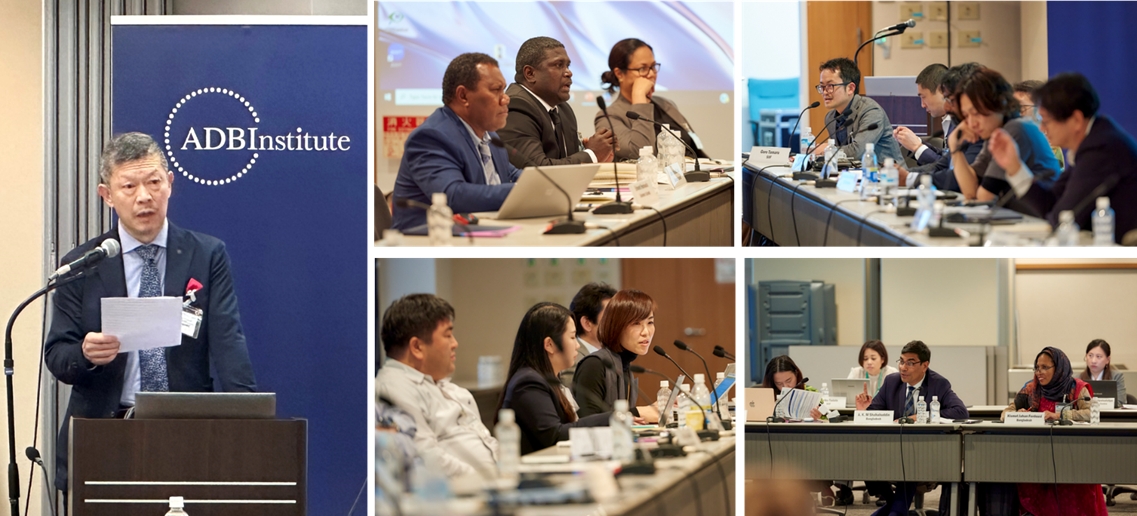
Opening remarks by OPRI President Hide Sakaguchi and the vibrant discussion in the workshop (Photo Credit: Left: Asian Development Bank Institute / Others: SIIF)
Creating an environment for ocean financing from various perspectives
The workshop proceeded with dialogue between the multi-nation Development Bank, investors, and ventures. Yoko Watanabe, Director, Environment at ADB, introduced the ADB’s Projects and Action Plan for a Healthy Ocean and Blue Economy, including ADB Blue Bond, ORCA Trust Fund, Nature Bonds Incubator, and Oceans Forum.
Christian Lim, Managing Director, SWEN Capital Partners stressed that innovation holds the potential to transform entire ocean-impacting industries and contracts into a regenerative blue economy. He made a call to action for the creation of 1000 Ocean Startups that will be transformative and invent and deploy critical innovations for ocean health. The group supports an impact measurement framework, i.e., SWAN’s Blue Ocean Fund, with 70% of its funding derived from institutional financiers to drive positive change and transition towards “a regenerative blue economy.”
Christian Lim, Managing Director, SWEN Capital Partners stressed that innovation holds the potential to transform entire ocean-impacting industries and contracts into a regenerative blue economy. He made a call to action for the creation of 1000 Ocean Startups that will be transformative and invent and deploy critical innovations for ocean health. The group supports an impact measurement framework, i.e., SWAN’s Blue Ocean Fund, with 70% of its funding derived from institutional financiers to drive positive change and transition towards “a regenerative blue economy.”

ADB Yoko Watanabe Environment Director and the panel discussion (Photo Credit: SIIF)
In the discussion of accelerating ocean investment, Romy Cahyadi, CEO, Installer, introduced the case study of the Blue Finance Accelerator Program in Indonesia, which aims to provide support for Startups and SMEs such as capacity building on business acceleration and innovation, impact measurement and management, and blue-themed modules. Sanjeev Krishnan, CIO of S2G Ventures showed that ocean asset inventory reveals that 40% of shared borders and 90% of shipping channels are intertwined with the ocean, providing water and resources for three billion people. Disruption of natural systems is underway, with space innovation, risk capital, and entrepreneurship transforming similar asset bases. This transformation is a testament to the evolving dynamics of harnessing the potential of ocean resources.
For the blue impact evaluation, Ron Tardiff, Lead and Member of the Steering Committee of the 1000 Ocean Startups Coalition, introduced the Ocean Impact Navigator (OIN)—an open-source impact KPI framework designed to simplify, harmonize, and strengthen impact measurement and reporting for the Ocean Impact Innovation ecosystem. OPRI Research Fellow Dr. Hajime Tanaka illustrated the impact assessment of blue economy through measuring use values (quantities, e.g., CO2 levels, fisheries, sequestration) and non-use values (pertaining to the mere existence of resources and their importance to future generations, which cannot be easily market-evaluated) to help decision-making for governments, investors, and enterprises.
For the blue impact evaluation, Ron Tardiff, Lead and Member of the Steering Committee of the 1000 Ocean Startups Coalition, introduced the Ocean Impact Navigator (OIN)—an open-source impact KPI framework designed to simplify, harmonize, and strengthen impact measurement and reporting for the Ocean Impact Innovation ecosystem. OPRI Research Fellow Dr. Hajime Tanaka illustrated the impact assessment of blue economy through measuring use values (quantities, e.g., CO2 levels, fisheries, sequestration) and non-use values (pertaining to the mere existence of resources and their importance to future generations, which cannot be easily market-evaluated) to help decision-making for governments, investors, and enterprises.
OPRI-SIIF Special Session on “Accelerating Blue Economy with Blue Impact Finance”
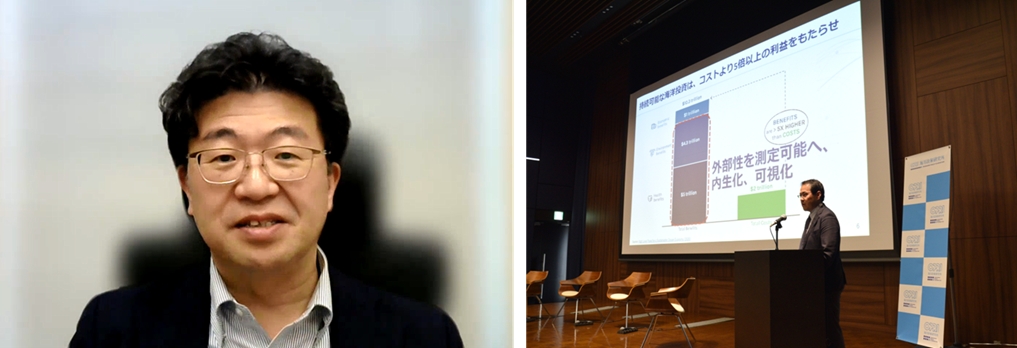
Remarks by SPF President Atsushi Sunami; introduction of Blue Impact Finance by OPRI Michael C. Huang Senior Fellow
In the special session on “Accelerating Blue Economy with Blue Impact Finance” organized by SIIF and OPRI, Dr. Atsushi Sunami, President of the Sasakawa Peace Foundation, stressed that innovative initiatives in Japan are needed in the marine industries, emphasizing collaboration and innovation for a sustainable future. OPRI Senior Research Fellow, Dr Michael C. Huang gave a presentation on the aim to facilitate the ocean investment environment and introduced the current development of Blue Impact Finance. OPRI will serve as a knowledge partner with OIN to publish more impact analyses of ocean ventures from Japan and the Asia-Pacific region on a proposed special website, “Blue Impact Finance Initiative (BIFI),” to be released in February 2025.
SIIF Impact Officer, Goro Tamaru gave a systematic analysis on Japan’s ocean issues, followed by the presentation of ventures from Japan and around the world, including Fisherman Japan, Shizen Energy Group, Oceanium, Sea Vegetable, Innoqua; and UMITO Partners Inc. presented about the sustainability design of local economies through ocean sustainability. Nanako Kudo, Member of the Executive Committee, SIIF, chaired the panel discussion with venture representatives and Christian Lim (SWEN Capital Partners) and Sanjeev Krishnan (S2G Ventures). They discussed partnerships developed with government support, advocated for public-private partnership approaches and the sharing of risks. The discussants also emphasized how such collaborations have helped break barriers in the global social innovation system.
SIIF Impact Officer, Goro Tamaru gave a systematic analysis on Japan’s ocean issues, followed by the presentation of ventures from Japan and around the world, including Fisherman Japan, Shizen Energy Group, Oceanium, Sea Vegetable, Innoqua; and UMITO Partners Inc. presented about the sustainability design of local economies through ocean sustainability. Nanako Kudo, Member of the Executive Committee, SIIF, chaired the panel discussion with venture representatives and Christian Lim (SWEN Capital Partners) and Sanjeev Krishnan (S2G Ventures). They discussed partnerships developed with government support, advocated for public-private partnership approaches and the sharing of risks. The discussants also emphasized how such collaborations have helped break barriers in the global social innovation system.
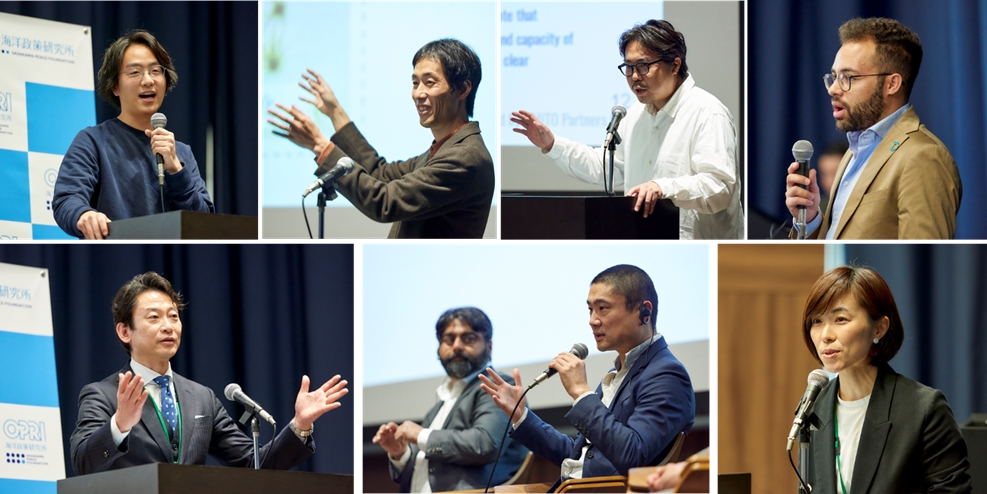
Discussion among ocean ventures and investors (Photo Credit: SIIF)
Site visit to Shizuoka and Policy Dialogue
In addition to the indoor discussion, participants visited Shizuoka prefecture as an excursion. Participants visited the Miho Underground Seawater Farming Center (operated by NIKKEN LEASE KOGYO CO. LTD). The land-based aquaculture utilizes the interdisciplinary synergy of deep seabed water, nano bubble technology, as well as proximity to the UNESCO World Heritage – Mt Fuji to make value-added brands of salmon and mackerel at 10 times the usual price. With little intervention on water temperature controls, the fish farm could be operated by only 3 staff. The case gave every participant ideas on competitive advantage to take back to their home countries.
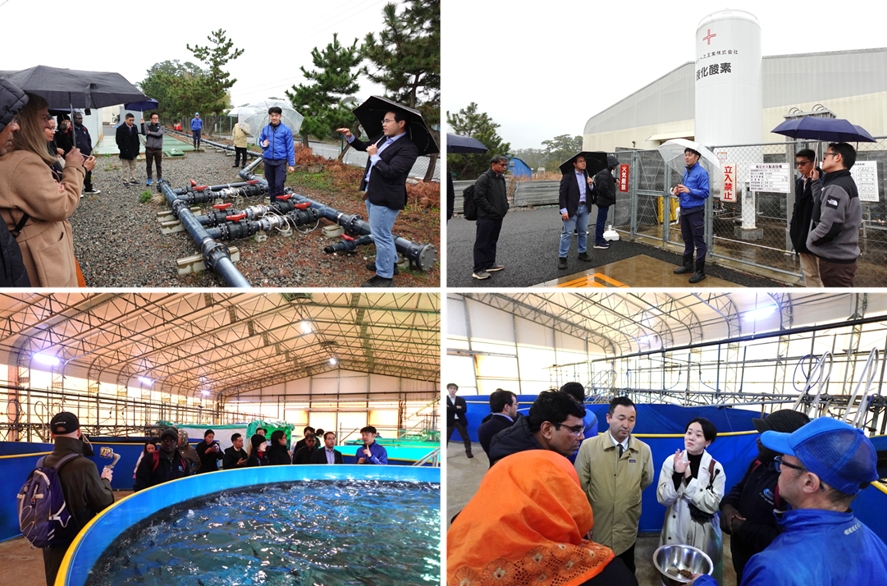
Government officials from Asian-Pacific and venture investors visited Miho Underground Seawater Farming Center (Photo credit: Asian Development Bank Institute)
The policy dialogue included presentations about the challenges faced by developing countries, by country representatives from Bangladesh, Cambodia, Samoa, Solomon Islands, Palau, and Vietnam. The government representatives emphasized the importance of capacity building on attracting investment and participating in business opportunities in each country. The Marine Open Innovation Institute (MaOI) discussed its public-private partnerships on supporting innovation and technology of local enterprises.
The promotion of Blue Impact Finance could be key to realizing sustainable utilization of the oceans, through emphasizing collaboration between ventures and research institutions and prioritizing societal and marine impacts. This workshop was held with the aim to promote cross-industry collaboration and platforms for ocean investments and create a more accessible environment for ocean investments through Blue Impact Finance. Through this workshop, country representatives from the Asia-Pacific region, along with investors and startup companies from Europe, the US and Japan, shared their perspectives and gained insights into strategic initiatives through international cooperation. OPRI, together with SIIF and ADBI, will continue to promote this comprehensive dialogue platform for Blue Impact Finance.
The promotion of Blue Impact Finance could be key to realizing sustainable utilization of the oceans, through emphasizing collaboration between ventures and research institutions and prioritizing societal and marine impacts. This workshop was held with the aim to promote cross-industry collaboration and platforms for ocean investments and create a more accessible environment for ocean investments through Blue Impact Finance. Through this workshop, country representatives from the Asia-Pacific region, along with investors and startup companies from Europe, the US and Japan, shared their perspectives and gained insights into strategic initiatives through international cooperation. OPRI, together with SIIF and ADBI, will continue to promote this comprehensive dialogue platform for Blue Impact Finance.
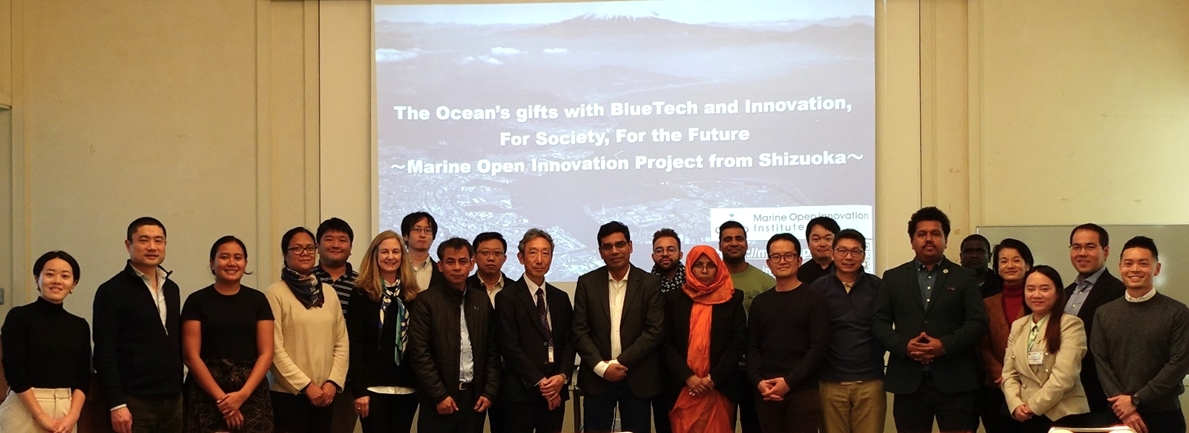
MaOI and the participants in the policy dialogue (Photo credit: Asian Development Bank Institute)
(By Michael C. Huang, Senior Research Fellow, OPRI)